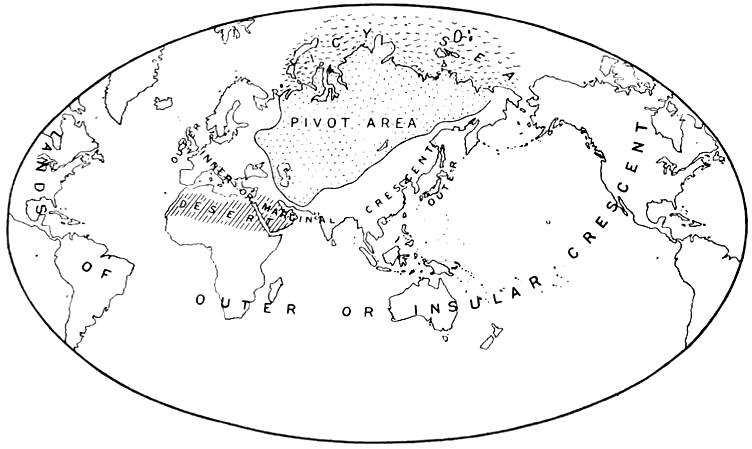Mackinder's Heartland Theory

Though they may be deemed outdated now, Sir Halford Mackinder's Heartland Theory and his writings on geopolitics offer some fascinating--and still relevant--pieces of wisdom on the relations between geography, history, and foreign policy. My poli-sci class inspired me to do some further reading, so I read "The Geographical Pivot of History" (1904) and its follow-up, Democratic Ideals and Reality (1919).Who rules East Europe, commands the Heartland
Who rules the Heartland, commands the World Island
Who rules the World Island, commands the World
The "Geographical Pivot" (5/5 stars) is a succinct description of the Heartland Theory, while Democratic Ideals (4/5 stars) is much slower and more intense, focusing heavily on Mackinder's historical basis for the theory. Most of the history went over my head, but the gist of it--sea power vs. land power--provided a good argument for the eminently strategic location of Eastern Europe.
It's debatable whether the Heartland Theory holds true today: new technology and increasing globalization have certainly altered geographic advantages/limitations. If nothing else, however, Mackinder masterfully demonstrates the kind of critical thinking and analysis that people (not just politicians) would do well to use today. Democratic Ideals was written in December 1918, and already Mackinder was hinting at the possibility of WWII, if peace treaties and the League of Nations were not effective. He also predicts aspects of the Cold War, as in the following quote:
It may be the case that Bolshevik tyranny is an extreme reaction from Dynastic tyranny, but it is none the less true that the Russian, Prussian, and Hungarian plains, with their widespread uniformity of social conditions, are favorable alike to the march of militarism and to the propaganda of syndicalism. Against this two-headed Eagle of land-power the Westerners and Islanders must struggle.The last two chapters of Democratic Ideals are the most worthwhile, dealing with the potential success or failure of the League of Nations (and, theoretically thereby, world peace). This is also where he presents additional arguments on certain subtopics, such as the importance of nations' "balanced development" and local vs. international organization.
There are a few problems in the book. One is the term "democratic", which he uses rather loosely. Secondly, some of his opinions/perspectives seem to be negatively biased by the era in which he lived (though this is unsurprising for a book 100+ years old). Thirdly, there is his idea of reorganizing/locating certain people in Central Europe. [Of this last, it is unclear to me whether he really supports the idea (as it seemed to me), or is simply illustrating his low expectations for peaceful relations in that area.] Read with a grain of salt.
I highly recommend "The Geographical Pivot of History" (online PDF) to anyone, and poli-sci enthusiasts will want to check out Democratic Ideals and Reality as well.
Favorite quotes:
"To the eighteenth-century ideal of Liberty, and the nineteenth-century ideal of Nationality, we have added our twentieth-century ideal of the League of Nations."
"Productive power, in short, is a far more important element of reality in relation to modern civilization than is accumulated wealth."
"You may strike at the two flanks of your enemy, the right and the left, but unless your force is sufficient to annihilate you must decide beforehand which stroke is to be the feint and which the real attack."
"The end of the present disorder [in Germany] may only be a new ruthless organization, and ruthless organizers do not stop when they have attained the objects which they at first set before them." (Nazi Germany foretold)
"...the lessons of History are not to be learned from a single instance."
"Civilization, no doubt, consists in the exchange of services, but it should be an equal exchange."
"...most people today are very open to 'suggestion', a fact well known to the experienced in elections, who rarely stop to reason with their audiences."
"Why were Athens and Florence the wonderful founts of Civilization which have made them the teachers of the world? They were small cities as we now count the size of cities, but they were sovereign cities both in the political and economic sense."
"...his [the Londoner's] life of ideas is detached from his responsible life, and both suffer infinitely in consequence."



Comments